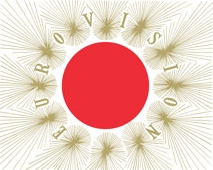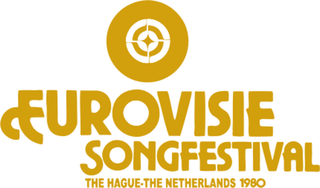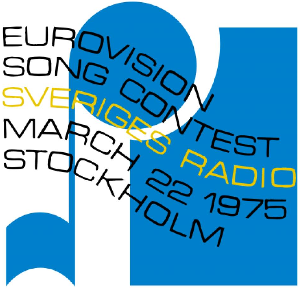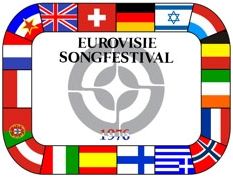
The Eurovision Song Contest 1969 was the 14th edition of the annual Eurovision Song Contest. It took place in Madrid, Spain, following the country's victory at the 1968 contest with the song "La La La" by Massiel. Organised by the European Broadcasting Union (EBU) and host broadcaster Televisión Española (TVE), the contest was held at the Teatro Real on 29 March 1969 and was hosted by Spanish television presenter and actress Laurita Valenzuela.

The Eurovision Song Contest 1968 was the 13th edition of the annual Eurovision Song Contest. It took place in London, United Kingdom, following the country's first victory at the 1967 contest with the song "Puppet on a String" by Sandie Shaw. Despite having won for the first time the year before, it was actually the third time that the United Kingdom had hosted the competition, having previously done so in 1960 and 1963, both of which also took place in London. Organised by the European Broadcasting Union (EBU) and host broadcaster British Broadcasting Corporation (BBC), the contest was held at Royal Albert Hall on 6 April 1968, and was hosted by Katie Boyle for the third time. It was notably also the first time that the contest was broadcast in colour.

The Eurovision Song Contest 1966 was the 11th edition of the annual Eurovision Song Contest. It took place in Luxembourg City, Luxembourg, following the country's victory at the 1965 contest with the song "Poupée de cire, poupée de son" by France Gall. Organised by the European Broadcasting Union (EBU) and host broadcaster Compagnie Luxembourgeoise de Télédiffusion (CLT), the contest was held at the Villa Louvigny on 5 March 1966 and was hosted by Luxembourgish television presenter Josiane Chen.

The Eurovision Song Contest 1967 was the 12th edition of the annual Eurovision Song Contest. It took place in Vienna, Austria, following the country's victory at the 1966 contest with the song "Merci, Chérie" by Udo Jürgens. Organised by the European Broadcasting Union (EBU) and host broadcaster Österreichischer Rundfunk (ORF), the contest was held at the Großer Festsaal der Wiener Hofburg on 8 April 1967, becoming the first contest held in the month of April, and was hosted by Austrian actress Erica Vaal.

The Eurovision Song Contest 1970 was the 15th edition of the annual Eurovision Song Contest and took place in Amsterdam, Netherlands. Organised by the European Broadcasting Union (EBU) and host broadcaster Nederlandse Omroep Stichting (NOS), the contest was held at the RAI Congrescentrum on 21 March 1970, and was hosted by Dutch television presenter Willy Dobbe.

The Eurovision Song Contest 1995 was the 40th edition of the Eurovision Song Contest, held on 13 May 1995 at the Point Theatre in Dublin, Ireland. Organised by the European Broadcasting Union (EBU) and host broadcaster Radio Telefís Éireann (RTÉ), and presented by Mary Kennedy, the contest was held in Ireland following the country's victory at the 1994 contest with the song "Rock 'n' Roll Kids" by Paul Harrington and Charlie McGettigan. It was the third consecutive contest to be held in Ireland – the first and only time in the history of the event that a country has hosted three editions in a row – and the second consecutive edition to be held in the Point Theatre in Dublin.

The Eurovision Song Contest 1994 was the 39th edition of the Eurovision Song Contest, held on 30 April 1994 at the Point Theatre in Dublin, Ireland. Organised by the European Broadcasting Union (EBU) and host broadcaster Radio Telefís Éireann (RTÉ), and presented by Cynthia Ní Mhurchú and Gerry Ryan, the contest was held in Ireland following the country's victory at the 1993 contest with the song "In Your Eyes" by Niamh Kavanagh. It was the first time that any country had hosted two successive editions of the contest, following the previous year's contest held in Millstreet.

The Eurovision Song Contest 1988 was the 33rd edition of the Eurovision Song Contest, held on 30 April 1988 in the RDS Simmonscourt Pavilion in Dublin, Ireland and presented by Pat Kenny and Michelle Rocca. Organised by the European Broadcasting Union (EBU) and host broadcaster Radio Telefís Éireann (RTÉ), the contest was held in Ireland following the country's victory at the 1987 contest with the song "Hold Me Now" by Johnny Logan.

The Eurovision Song Contest 1981 was the 26th edition of the annual Eurovision Song Contest. It took place in Dublin, Ireland, following the country's victory at the 1980 contest with the song "What's Another Year" by Johnny Logan. Organised by the European Broadcasting Union (EBU) and host broadcaster Radio Telefís Éireann (RTÉ), the contest was held at the RDS Simmonscourt on 4 April 1981, and was hosted by Irish television journalist Doireann Ní Bhriain.

The Eurovision Song Contest 1980 was the 25th edition of the annual Eurovision Song Contest. It took place in The Hague, Netherlands, and was organised by host broadcaster Nederlandse Omroep Stichting (NOS) – which agreed to stage the event after Israel, having won in both 1978 and 1979, declined to host it for a second successive year – and the European Broadcasting Union (EBU). The contest was held at the Nederlands Congresgebouw on 19 April 1980 and was hosted by Dutch actress Marlous Fluitsma, although each song was introduced by a presenter from the participating nation.

The Eurovision Song Contest 1979 was the 24th edition of the annual Eurovision Song Contest. It took place in Jerusalem, Israel, following the country's victory at the 1978 contest with the song "A-Ba-Ni-Bi" by Izhar Cohen and the Alphabeta. Organised by the European Broadcasting Union (EBU) and host broadcaster the Israel Broadcasting Authority (IBA), the contest was held at the Menachem Ussishkin auditorium of the International Convention Centre on 31 March 1979, and was hosted by Israeli television presenter Daniel Pe'er and singer Yardena Arazi. This was the first time that the Eurovision Song Contest was held outside Europe.

The Eurovision Song Contest 1982 was the 27th edition of the annual Eurovision Song Contest. It took place in Harrogate, United Kingdom, following the country's victory at the 1981 contest with the song "Making Your Mind Up" by Bucks Fizz. Organised by the European Broadcasting Union (EBU) and host broadcaster British Broadcasting Corporation (BBC), the contest was held at the Harrogate International Centre on 24 April 1982 and was hosted by English TV presenter and newsreader Jan Leeming.

The Eurovision Song Contest 1973 was the 18th edition of the annual Eurovision Song Contest. It took place in Luxembourg City, Luxembourg, following the country's victory at the 1972 contest with the song "Après toi" by Vicky Leandros. Organised by the European Broadcasting Union (EBU) and host broadcaster Compagnie Luxembourgeoise de Télédiffusion (CLT), the contest was held at the Grand Théâtre on 7 April 1973 and was hosted by German television presenter Helga Guitton.

The Eurovision Song Contest 1972 was the 17th edition of the annual Eurovision Song Contest. It took place in Edinburgh, Scotland, United Kingdom and was organised by the European Broadcasting Union (EBU) and host broadcaster British Broadcasting Corporation (BBC), who agreed to stage the event after the Monégasque broadcaster Télé Monte Carlo (TMC), who won in 1971, was unable to meet the demands of hosting the event and could not find a suitable venue. The contest was held at the Usher Hall on 25 March 1972 and was hosted by Scottish ballet dancer Moira Shearer. Eighteen countries took part in the contest, the same number as the previous year.

The Eurovision Song Contest 1974 was the 19th edition of the Eurovision Song Contest, held on 6 April 1974 in the Dome in Brighton, United Kingdom. Organised by the European Broadcasting Union (EBU) and host broadcaster the British Broadcasting Corporation (BBC), and presented by Katie Boyle, this was the fifth time that the United Kingdom had staged the contest.

The Eurovision Song Contest 1978 was the 23rd edition of the annual Eurovision Song Contest. It took place in Paris, France, following the country's victory at the 1977 contest with the song "L'Oiseau et l'Enfant" by Marie Myriam. Organised by the European Broadcasting Union (EBU) and host broadcaster Télévision Française 1 (TF1), the contest was held at the Grand Amphitheatre inside the Palais des Congrès on 22 April 1978 and was directed by Bernard Lion. The contest was presented by French television presenters Denise Fabre and Léon Zitrone. This was the first time that more than one presenter had hosted the contest as well as the first to have a male presenter since 1956.

The Eurovision Song Contest 1977 was the 22nd edition of the annual Eurovision Song Contest. It took place in London, United Kingdom, following the country's victory at the 1976 contest with the song "Save Your Kisses for Me" by Brotherhood of Man. Organised by the European Broadcasting Union (EBU) and host broadcaster British Broadcasting Corporation (BBC), the contest was held at the Wembley Conference Centre on 7 May 1977, marking the first time the event took place in the month of May since the first contest in 1956. The contest was directed by Stewart Morris and hosted by English journalist Angela Rippon.

The Eurovision Song Contest 1975 was the 20th edition of the Eurovision Song Contest, held on 22 March 1975 in the Sankt Eriks-Mässan in Stockholm, Sweden and presented by Karin Falck. Organised by the European Broadcasting Union (EBU) and host broadcaster Sveriges Radio (SR), the contest was held in Sweden following the country's victory at the 1974 contest with the song "Waterloo" by ABBA. Nineteen countries were represented at the contest – a new record number of participants. Turkey made its first entry in the contest, and France and Malta returned after a one- and two-year absence, respectively. Greece, after participating for the first time in the previous year's event, opted not to participate in 1975.

The Eurovision Song Contest 1976 was the 21st edition of the annual Eurovision Song Contest. It took place in The Hague, Netherlands, following the country's victory at the 1975 contest with the song "Ding-a-dong" by Teach-In. Organised by the European Broadcasting Union (EBU) and host broadcaster Nederlandse Omroep Stichting (NOS), the contest was held at the Nederlands Congrescentrum on 3 April 1976 and was hosted by 1957 Dutch Eurovision winner Corry Brokken.
Spain was represented at the Eurovision Song Contest 1969 with the song "Vivo cantando", composed by María José de Ceratto, with lyrics by Aniano Alcalde, and performed by Salomé. The Spanish participating broadcaster, Televisión Española (TVE), selected its entry through a national final, after having previously selected the performer internally. The song won the competition in a joint win with the songs from France, the Netherlands, and the United Kingdom. In addition, TVE was also the host broadcaster and staged the event at the Teatro Real in Madrid, after winning the previous edition with the song "La, la, la" by Massiel, becoming the first participating broadcaster to win twice in a row.






















